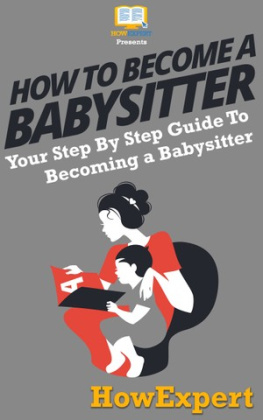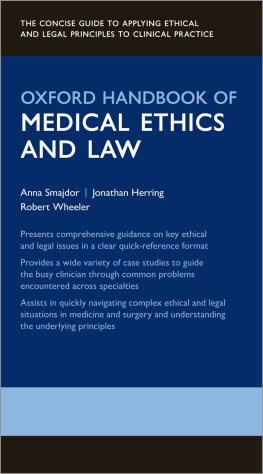Dear
Babysitter
HANDBOOK
by Vicki Lansky

Book Peddlers
Deephaven, MN
 | CONTENTS |  |
You are entrusted with the care of the most important people in the worldCHILDREN. Theyre your priority. Your job is to watch over them and to keep them safe from harm. Please give them your undivided attention. Babysitting isnt all hard work. Youll find that it involves lots of play which can be fun for you, too.
Browse though this book so youll know whats in it in case you need information in a hurry. Do your best to follow instructions about how to handle the childrens wants and needs. TLC (Tender Loving Care!) will go a long way toward getting the children to accept you and enjoy your company.
If you have given up the time to take a special course in babysitting or first aid--great!
You need to abide by house rules even if they differ from those of your own home. In general, just follow rules of common courtesy and respect for the kids and the home.
Remember to leave the information (phone number and address) of where you will be babysitting. Let your parents know when to expect you home. If the childrens parents are delayed, let your parents know, so they will not be worried.
Please take the time to download the various worksheets throughout this book for each of your babysitting jobs. These worksheets can be found at www.bookpeddlers.com.
Dont tie up any phone, including your cell phone. When answering a home call, dont let the caller know that there isnt a parent in the house unless it is a known family member or friend. Just tell the caller that person cant answer the phone right now. Ask if you can take a phone number or message and be sure you write it down.
Familiarize yourself with the house but dont go looking through closets and drawers.
Resist refrigerator raids. If youve been told to help yourself, dont overdo it. Check the kitchen counter and the refrigerator to see if there are things marked for snacks or meals.
Leave the house as orderly as you found it. The easiest way to do that is not to put things down but to put them away. At the very least wash and dry dishes and cups used by you and/or the children.
Try to stay awake and alert until 11 or 12 pm, unless youve been told otherwise by the parents. Its important you be able to hear a crying baby or a waking child.
Do not use earbuds or other listening devices that may hinder your ability to hear a crying baby, a waking child or other noises in the house.
Do not have our friends over without permission.
Parents always want to know of any illness or accident, however minor. Maybe something broke. That happens. Writing down the details will help.
If you have to break a future sitting appointment, please let the parent know as far in advance as possible. They should try to do the same for you.
Common sense will be your best guide when youre trying to get children to do what theyre supposed to do. You know that you dont like to be spoken to in a rough or angry manner. Children dont either. Try to be agreeable and friendly. Asking for the childrens help with a situation will make them feel important, often more cooperative, and may give you the solution.
Remember that you are NOT expected to be the childs parent, doctor or teacher. If something comes up that you just cant handle, call the parents (or your parents) or in a real emergency, call for the appropriate outside emergency help.
First check for the possible reason: hunger, thirst, wetness, discomfort from being too cool or too warm, a thread from clothes caught between fingers or toes.
Try one or more of the classic calmers: motion (pick the baby up, dance or walk around with the baby); warmth (wrap the baby in a blanket); soothing sounds (turn on a radio or music or sing to the baby). Maybe a wind-up swing will work. If nothing does, put the baby in the crib for a few minutesas a breather for yourselfthen go in and try again.
If youre bathing a baby, follow the parents instructions carefully. Have a big towel handy (better yet, pinned around the back of your neck) to receive the wet, slippery little body and keep yourself dry at the same time.
Never leave a child youre bathing in the tub alone. NEVER. Let the phone or doorbell ring, or wrap the child in a towel and take him or her with you.
Try to make a game of bathing if a child is afraid of the bath. Run the water before taking the child into the bathroom and use only a few inches of water.
If youre feeding an infant, see page 12 for tips on bottles and burping.
Allow plenty of time for small children. They are often slow eaters. Expect a certain amount of messiness and dont worry about manners, unless an older child is out of control.
If a child wont eat, dont worry. Offer food (but not cookies or dessert) a little later and dont make a big deal of it.
Dont give food to a child on the run. A child should be seated to minimize the chance of choking.
Be sure to watch a child in a high chair carefully. Fasten belt or straps securely; dont turn your back on a child or let a child stand up in the high chair.
First of all, try to head off too much excitement for a child. Mix quiet activities with strenuous ones.
When you cant avoid excitement, slow the pace with active but not wild playa run around the outside of a house or a game of strength.
Offer a non-sugary snack. Be sure the child is sitting to eat.
Avoid rough play and running games before bedtime. Excitement makes it hard for children to fall sleep. Promise a story once the child is in pajamas and under the covers.
Check a sleeping child once an hour or so. Check an infant more frequently. Keep TVs, radios or other music turned down so you can hear a child who wakes. Dont wear headphones after youve put a child to bed.
NEVER leave childreneven soundly sleeping onesalone in their home.
Dont laugh at a child whos scared of anythingthe dark, thunder, or even imaginary monsters. Treat a childs fear seriously and do what you can to reassure him or her.
Try leaving a night light (or even a small room light) on for a child afraid of the dark; boom back at thunder; blow monsters away or flush them down the toilet.
Tell the child about some fear you had when you were little and how you overcame it.
Try to avoid putting a child in a position of saying NO. Give face-saving options like How about ...? or Shall we....? instead of Now you must ...
Offer a child a choice of A or B.Do you want to do this now, or after your nap? Do you want a pear or a banana?
Never use physical punishment on an uncooperative child. You can look sternly into the childs eyes when telling a child how to behave or send the child to another room for 5 minutes or forbid TV or another favorite activity. If you threaten to tell about poor behavior, and a child continues, be sure you follow through and let the parents know. Children catch on to idle threats quickly.
Next page








